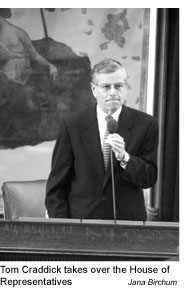Capitol Offenses
Meet the New Boss
Pete Laney looked strange sitting at his desk on the first day of the 78th Legislature. Not smaller, exactly, but ill at ease. Seated in the left rear of the chamber, he was about as far as physically possible from his accustomed seat in the Speaker’s chair. On his left was his wife Nelda, seated in one of the temporary chairs that filled the aisles in the packed house; on his right was his new Republican deskmate, Toby Goodman, along with his family. Laney clapped politely at the end of each nominating speech for his successor, Tom Craddick, the West Texas colleague and former friend turned enemy. During the speeches he sat absolutely still, barely moving even when Peggy Hamric, the Houston Republican, paused in her nominating speech to thank him for his decade of service as Speaker, which prompted a hearty standing ovation from the members and the packed gallery.

The gesture was genuine and bipartisan. Laney’s legacy, almost everyone agrees, will be fairness, good government, and, perhaps above all else, bipartisanship. But the Republicans Laney tapped for committee chairs over the years were not those coming to the mike now to sing Craddick’s praises. Hamric most people know, but who the hell, some in the chamber must have been wondering, is Phil King? What has Kenny Marchant ever done? Diane Delisi? One suspects we’re all about to get to know them a lot better (though Craddick’s committee selections had not been revealed at press time). Others who came forward for Craddick were a little more familiar: Corpus Christi Democrat Vilma Luna, a leader of the small exodus of minority members who crossed over early to endorse Craddick and ensure his victory. Her nominating speech was short and maybe a trifle defensive, emphasizing her “personal objectives” and her duty to her constituents (presumably one and the same, but she did mention them separately). She was followed by Glenn Lewis, the black Ft. Worth Democrat. Ron Wilson, the veteran Democrat from Houston, made an appearance as well, to nobody’s particular surprise.
“Democracy cannot endure without vision,” Hamric told the chamber, “and Tom Craddick is a visionary.” It’s early yet to assay what Craddick’s vision for Texas will be, but his changes to the House rules offer more than a little insight into his vision for how the House of Representatives should be run. A draft of the new rules began circulating in December. The most controversial revision by far was removing seniority appointments to the all-important Appropriations Committee, the House’s budget-writing panel. Under Speaker Laney, up to half of the 27-member committee was selected by seniority, with the remainder appointed by the speaker. Under the new rules, the now 29-member committee will be made up of a chair, a vice-chair, and the chair of budget and oversight (CBO) of the House’s 27 substantive committees, each of whom will be chosen by the speaker. With so many more senior Democrats than Republicans, it was a considerable power grab. In any scenario, Craddick would be hard pressed to put less than 10 Democrats on the now-29 member committee, so in actual numbers, eliminating seniority will probably only cost the Democrats two or three seats. But Craddick will now control which Democrats get to serve, and which will not. Among Appropriations veterans almost sure to get the axe will be longtime advocates for responsible funding of health and human services, such as Garnet Coleman, Pete Gallego, and Craig Eiland.
The new rules preserve seniority for most other committees, but several have been shrunk in size from nine members to seven, reducing the number of seats available for seniority appointments. One move that set the lobby buzzing was Craddick’s splitting of the powerful State Affairs Committee, which oversees such high stakes issues as electric utility deregulation and telephone service. Formerly a 15-member committee, State Affairs will be reduced to nine, and its duties will be spread among several committees. Utility regulation bills will now come before a new, seven-member committee called Regulated Industries. Craddick will select the chair, vice chair, and CBO of the committee, leaving just half of the remaining four seats to be filled by seniority. Thus the state’s most powerful lobbies, the investor-owned electric utilities and Southwestern Bell, will now move their bills through a committee with only two independent voices, as opposed to six in the old 15-member State Affairs Committee.
Passing the new rules would be the first test of Craddick’s new majority. The next morning, on his first full day as Speaker, the Democrats served notice that they would not be rolling over, at least not yet. Peggy Hamric introduced the first set of changes, a relatively minor collection of amendments to the housekeeping resolution, the rules that govern members’ salaries, expense accounts, use of house funds, and the like. Craddick had already yielded on a controversial measure from his first draft of the resolution, an amendment to lift the salary cap for committee employees. It was widely perceived to be a means of hiring industry hacks or lobbyists to head committee staff, the kind of “professionals” that wouldn’t deign to work for $3500 per month. Perhaps aided by the $9.9 billion budget shortfall, the Dems persuaded Craddick to drop that one. But that didn’t deter them from holding up the housekeeping resolution for two hours, chiefly with an amendment directing the House to give up a bit of its own operating budget in a symbolic gesture of fiscal austerity. The amendment went down by a count likely to be a familiar one by June: 88 to 53, roughly the partisan split of the new House. When the gavel came down on the first day of the 78th, Laney was one of the first to leave the chamber for a change. “It’s gonna be a long session,” he told a colleague as he stepped out into the lobby.
The next day the Democrats made their stand against the substantive rule changes. In an unusual move, they chose Austin freshman Eddie Rodriguez to introduce their amendment restoring seniority to the Appropriations Committee. Paul Moreno, the veteran El Paso Democrat, made an impassioned plea for the amendment from the wheelchair-level microphone installed for him years ago. He recalled his own struggle to reform the rules in the 1970s, when both he, as one of the first Hispanic members, and Craddick, as one of the only Republicans in the House, were shunned by the House leadership. Craddick himself, Moreno reminded the new members, was once a member of the Dirty 30, the celebrated group of reformers who stood up to iron-fisted Speaker Gus Mutscher in the early 1970s. “We are regressing, members. We are taking a step back,” he told them. “I know it’s futile, but I can’t let it go,” Moreno continued. “I want our new members like this young man [Rodriguez] to be able to say ‘I want to be on Appropriations even though I voted against the Speaker, against a redistricting bill, against issues close to the leadership.”
In the end, Craddick had enough votes, and then some. At least half of the Democrats sided with the Speaker, in a sign of the pragmatism that will mark this session, as the Democrats adapt to being in the minority. The rules are not the real battle, in any case, not even half of it. “It won’t be a rule that contains Craddick,” said one former Laney staffer. “It will be that people are watching him.” A flurry of press reports questioning Craddick’s ethics (after the election, it should be noted) did seem to curb the enthusiasm of the incoming leader somewhat during the transition. And even the staid Dallas Morning News editorial page seems to be worried about preserving some balance in state government, now that Republicans have won the trifecta. In recent weeks the News seems to have lurched to the left, chastising the “no new taxes” crowd to get real about the budget, calling for responsible leadership on air pollution, opposing new prison construction, and, perhaps most stunningly, calling for a state-level version of OSHA, the federal job safety agency.
But for all his talk of cooperation and inclusiveness, Craddick may not have the luxury of preaching moderation to his stormtroopers, even if he were inclined to do so. One of the functions of the House leader is to protect the members from the baser instincts of the electorate, to give the moderate Republicans cover, for example, when they must vote against a truly bad abortion bill supported by the more excitable constituents in their districts. But Craddick does not have the moderates with him. The Tommy Merritts, Brian McCalls and Ed Kuempels of the House have all made it clear, to varying degrees, that they would have preferred to see someone else in the big chair. A thin margin means Craddick will rely all the more on the hard-core conservatives, what we might call the Wohlgemuth-Isett-Christian axis. As Marchant ominously opined in his nominating speech, this group supported Craddick so enthusiastically because the new Speaker does not have a history of “signaling right and turning left.” The far right will be expecting the moon from their man this session.
Which makes it all the more crucial that the Dems turn themselves into a true opposition party overnight. It’s a frame of mind the more liberal Dems, like Houston’s Garnet Coleman, are familiar with, since they often found themselves playing that role when their own party was in power. Coleman’s basement office has a ground level window just a few yards from the Capitol’s south steps. As a result, he heard every word of Perry’s inauguration speech—and every note of the Tejano band at the ensuing barbeque—whether he wanted to or not. Governor Perry’s zero-budget gimmick was hard for the veteran budget writer to swallow. (Instead of submitting a traditional budget to the Legislature, Perry turned in a document with hundreds of pages of zero’s, declaring that state agencies must justify ever dollar on his watch. Craddick heartily endorsed the “revolutionary” idea.) In part, Coleman said, Perry was simply ducking his obligation to say where he thought cuts should be made. Having promised no new taxes when the projected deficit was $5 billion, Perry and his budget writers apparently couldn’t handle the revised figure of almost double that amount.
But what the zero-based budget also does, Coleman says, is hide cuts. In the normal budgeting procedure, legislators take each agency’s previous biennial appropriation as a baseline and decide whether to increase or decrease the amounts for the various agency programs and functions. Take away the baseline and replace it with a zero, and you have nothing left with which to compare the new spending levels. It’s also hard to plan your defense strategy, as Brownsville Democrat Rene Oliveira pointed out, if the other guys haven’t even put out a budget yet.
An emergency appropriation is inevitable, Coleman said. But so are cuts. “The issue,” he said, “is who gets lopped off.”


